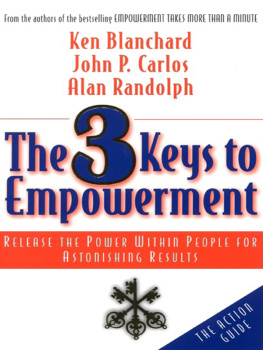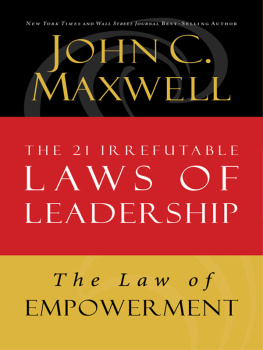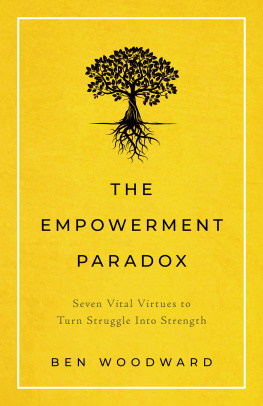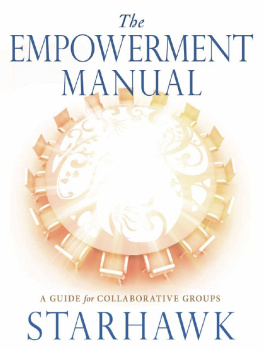Ken Blanchard, John P. Carlos, and Alan Randolph
The 3 Keys to Empowerment
Copyright 1999, 2001 by Blanchard Family Trust
All rights reserved. No part of this publication may be reproduced, distributed, or transmitted in any form or by any means, including photocopying, recording, or other electronic or mechanical methods, without the prior written permission of the publisher, except in the case of brief quotations embodied in critical reviews and certain other noncommercial uses permitted by copyright law. For permission requests, write to the publisher, addressed Attention: Permissions Coordinator, at the address below.

Berrett-Koehler Publishers, Inc.
235 Montgomery Street, Suite 650
San Francisco, California 94104-2916
Tel: (415) 288-0260, Fax: (415) 362-2512
www.bkconnection.com
Ordering information for print editions
Quantity sales. Special discounts are available on quantity purchases by corporations, associations, and others. For details, contact the Special Sales Department at the Berrett-Koehler address above.
Individual sales. Berrett-Koehler publications are available through most bookstores. They can also be ordered directly from Berrett-Koehler: Tel: (800) 929-2929; Fax: (802) 864-7626; www.bkconnection.com
Orders for college textbook/course adoption use. Please contact Berrett-Koehler: Tel: (800) 929-2929; Fax: (802) 864-7626.
Orders by U.S. trade bookstores and wholesalers. Please contact Ingram Publisher Services, Tel: (800) 509-4887; Fax: (800) 838-1149; E-mail: customer.service@ingrampublisherservices.com; or visit www.ingrampublisherservices.com/Ordering for details about electronic ordering.
Berrett-Koehler and the BK logo are registered trademarks of Berrett-Koehler Publishers, Inc.
First Edition
Hardcover print edition ISBN 978-1-57675-060-5
Paperback print edition ISBN 978-1-57675-160-2
PDF e-book ISBN 978-1-60509-340-6
IDPF ISBN 978-1-60994-305-9
2009-1
Proofreading: PeopleSpeak
Interior design and production: Joel Friedlander,Marin Bookworks
Indexing: Leonard Rosenbaum
Cover design: Richard Adelson
Dedicated
To all the pioneers of empowerment, the leaders, teams, and organizations who have taught us so much!
To Margie McKee Blanchard
My cofounder, coauthor, friend, and inspirational partner!
To C. Lynne Carlos
My partner, friend, and wife for thirty-two years and counting!
To Ruth Anne Gray Randolph
My best friend and partner in life!
ix
Preface
Our first book on empowerment, titled Empowerment Takes More Than a Minute and published in 1996 by Berrett-Koehler Publishers, has been a popular introduction to the challenges of creating a culture of empowerment. We have been gratified to see it on the Business Week Best Sellers List and to have it translated into ten languages besides English. By all accounts this book has been a success and has helped many managers and employees release the power within people for astonishing results.
What has been apparent also is that efforts to move to empowerment always raise questions for managers and employees alike. These questions are often quite detailed, and their answers were not always apparent in our first book. This second book, The 3 Keys to Empowerment, asks and answers those questions and provides a three-stage road map for the journey of changing to empowerment.
Everyone seems to agree that employees, managers, and companies can benefit from creating a culture in which people could be empowered. Involving employees in an empowered culture allows them to use their knowledge, experience, x and internal motivation to accomplish tasks for the organization. Employees become team members who are accountable for results that benefit the organization in both tangible and intangible ways. Employees also experience a sense of ownership, excitement, and pride in their work. Managers become team leaders who facilitate the involvement of team members. They find that results are achieved much easier than in a hierarchical culture, and they develop a new sense of pride from developing empowered teams that achieve far more than anyone thought possible.
The difficulty that everyone experiences is that talking about empowerment is a lot easier than creating a culture in which it can prosper. The title of our first book was designed to let people know that the movement from hierarchy to empowerment would not be easy. It would take more than an announcement, more than a wish, more than a small effort, indeed, more than a minute. It is not an easy task to give up the assumptions, behaviors, and systems (policies and procedures) that worked well in a hierarchical culture and replace them with assumptions, behaviors, and systems that support and expect empowerment, but it is doable in steps and in stages.
The 3 Keys to Empowerment is intended to be a guidebook for the journey. It is not a book designed for you to sit down and read in a few sittings, except to gain an overview of the issues. Rather, it is a users guide for the journey to Empowerment. The 3 Keys to Empowerment will help you keep on task and will definitely increase the speed of your journey. Think of your questions as you progress, find them in the various sections, and also find your answers. We know that this guidebook will make your journey much easier and xi will give you the confidence to continue. If you have questions that you cannot find in this book, please send them to us and we will provide you with our best thinking on that issue. We want you to succeed in reaching empowerment, so let this guidebookand us as referenceshelp you along the way.
Good luck to you as you undertake this most important and challenging journey! We are confident that the effort is worth it because in empowerment, you will release the power within people for astonishing results.
Ken Blanchard John Carlos Alan Randolph
INTRODUCTION
THE CHALLENGE OF MOVING TO EMPOWERMENT
Empowerment has been and remains one of the most promising but least understood concepts in business to date. First introduced in the 1980s, it quickly became a buzzword full of promise but short on delivery. Who could argue with the end result of empowerment? Ask senior managers if they want employees who accept responsibility, have a proprietary interest in the company, and want to work hard for company results, and the answer is, of course, yes. Ask employees if they want to feel valued, be involved in their jobs, and feel pride in the work they do, and the answer is, of course, yes.
Essentially, managers and employees want the same outcome. So why has it been so hard to achieve empowerment? Why has the concept fallen into disrepute? The answer is both simple and complex.
First, it is not the concept of empowerment that is flawed. Rather, it is peoples lack of understanding of how to move from a more traditional hierarchical mind-set to a mind-set of empowerment.
Too many managers view empowerment as giving people the power to make decisions. And too many employees view empowerment as being given free rein to do what they want to do. What we offer in this section is a better understaing of what empowerment really isa releasing of the power within people to achieve astonishing results. What we also offer is a macro-level understanding of the process and issues that must be addressed to create a culture of empowerment.

















